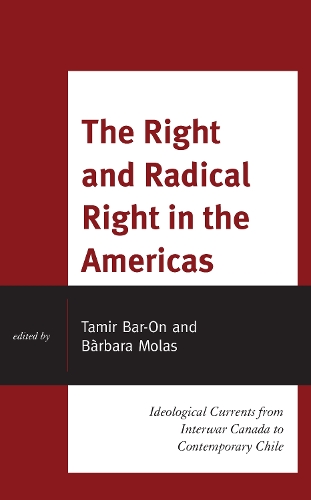
The Right and Radical Right in the Americas: Ideological Currents from Interwar Canada to Contemporary Chile
(Hardback)
Publishing Details
The Right and Radical Right in the Americas: Ideological Currents from Interwar Canada to Contemporary Chile
By (Author) Tamir Bar-On
Edited by Brbara Molas
Contributions by Nancy Aguirre
Contributions by Gilberto Aranda Bustamante
Contributions by Tamir Bar-On
Contributions by Antnio Costa Pinto
Contributions by Ron Dart
Contributions by Ray Kiely
Contributions by Brbara Molas
Contributions by Alberto Spektorowski
Bloomsbury Publishing PLC
Lexington Books
22nd November 2021
United States
Classifications
Professional and Scholarly
Non Fiction
International relations
320.52097
Physical Properties
Hardback
254
Width 161mm, Height 227mm, Spine 25mm
562g
Description
Studies of the right and radical right have proliferated since the rise of European nationalist and populist parties in the 1980s. Yet, the literature on the right and the radical right has a largely Euro-American bias and has been limited by partisan academics that focus on the left. The Right and Radical Right in the Americas hopes to be a pioneering work that examines the history and contemporary manifestations of the right and radical right throughout the Americas. From interwar Canada to contemporary Chile, the right and radical right have come in diverse ideological currents. Those ideological currents have undergone historical changes and the strategies of the right and radical right need to be contextualized in respect of country and region. The right and radical right also have distinctive meanings throughout the Americas and in different epochs.
Reviews
Latin America has for decades resembled a vast terra incognita in Anglophone surveys of the radical and fascist right in the Europeanized world, most of which have remained overwhelmingly Euro- and US-centric. The Right and Radical Right in the Americas, written by an impressive team of experts on national politics, offers students of comparative politics a welcome basis for more accurate generalizations about the rise of the right. In doing so it offers a valuable conceptual framework for the distinguishing between conservative, populist and extremist manifestations of resistance to secularization, multiculturalism and the globalized consumer society.
-- Roger Griffin, author of Fascism: An Introduction to Comparative Fascist StudiesAuthor Bio
Tamir Bar-On is professor-researcher in the School of Social Sciences and Government, Tec de Monterrey
Brbara Molas is head of publishing for the Steering Group of the Centre for Analysis of the Radical Right
